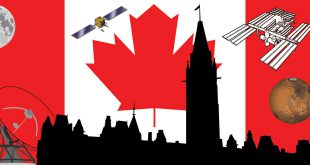One year after U.S. based Planet Labs Inc. threatened to pull its ground station assets out of Inuvik, and nearly three years after submitting a license request to operate in Canada’s high Arctic, the company has a Provisional License to operate its ground station.
According to Sarah Bates, Corporate Communications for Planet, Global Affairs Canada (GAC) issued a Provisional License to operate the ground station on February 11, 2019. She also said that Planet along with their Norwegian partner Kongsberg Satellite Services (KSAT) had to make some final modifications to the network configuration before operations began on February 22, 2019.
Planet has five ground station dishes available to them at the Canadian Satellite Ground Station Inuvik. The facility is managed locally by New North Networks, but owned by KSAT.
The five dishes include four which they own and are used for the Flock constellation of small satellites. They also use one KSAT owned dish for their larger SkySat satellites. Currently, only two of the four Planet dishes are operational, the other two will be in service soon.
For the company, the Inuvik based ground station is critical to its operations. While they have ground stations located globally, they did not have a ground station in this region of the high Arctic. Many of Planet’s satellites are in a Sun-synchronous orbit (SSO), meaning that with Inuvik’s geographic location, there is a greater opportunity to downlink data.
Mike Safyan, vice-president, Launch at Planet said the Inuvik ground station is “likely to be our most productive site.”
Another factor that made the Inuvik location desirable was the Mackenzie Valley Fibre Link, a Government of the Northwest Territories project that saw the installation of a 1,154km high-speed fiber optic telecommunications cable from McGill Lake in the south, approximately 80-kilometres south of Fort Simpson, to Inuvik in the North. That vital communication link was completed in March of 2017 and went operational in June of 2017.
Safyan said that about one third of all of the data from the Flock satellite constellation will go through the Inuvik ground station.
Safyan described getting operation as a “big win for us.” The provisional operating license should transition to a full license within a few months.
The problems at Global Affairs Canada not resolved
While Planet is happy with finally getting its provisional license, the issues that delayed it still exist. According to GAC it is supposed to complete a review of license applications within 180 days. That’s 6 months. In this case it took almost 3 years.
The problems at GAC were identified by a parliamentary mandated review of the Remote Sensing Space Systems Act (RSSA) report which was provided to government in February, 2017.
The report says the “Act was appropriate and useful at the time of its enactment in 2005, the players, activities, technology and internationalization of remote sensing activities have since changed significantly and outgrown the confines of the Act.”
It also states as a recommendation that Canada should implement a new General Outer Space Act.
Specific to GAC, one of the report findings included this key issue that still need to be addressed;
- The GAC office in charge of implementing the Act is underfunded and under-staffed; additional resources are required to maintain the proper implementation of the Act, especially as remote sensing space system applications increase.
The end result for Planet is they got what they wanted, however the process was difficult, fraught with uncertainty and time consuming. If not for the very specific benefit of the Inuvik location, the company would have pulled up stakes and done business elsewhere.
SpaceQ also spoke with Tom Zubko of New North Networks who said that while Planet has their Provisional License, KSAT is still waiting to be licensed for other customers data.
For companies like Planet wanting to take advantage of Inuvik’s location, fibre access and who must deal with the antiquated RSSSA law and understaffed GAC offices, they must be prepared for the uncertainty of how long it will take and if they’ll even get licensed.
Planet has said the issues it faced in Canada were unprecedented. In no other jurisdiction have they faced these problems.
For Inuvik, that Earth observation companies want to use the ground station facility should mean a boost to the local economy. But at the moment they aren’t getting the full economic benefit as the federal government is the problem.
 SpaceQ Space news and analysis.
SpaceQ Space news and analysis.



